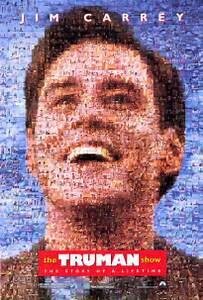Life and Social Media in 2018's Upside Down Truman Show
This holiday week, I watched the (highly recommended) new documentary "Jim & Andy: The Great Beyond," about how actor Jim Carrey creepily disappeared into the roles of Andy Kaufman and alter ego Tony Clifton in the biopic "Man on the Moon." In turn, that led me to another Carrey project of the era, 1998's "The Truman Show." And there, I quickly was reminded how much our relationship to entertainment and media has turned upside down the past two decades. "The Truman Show," which was nominated for three Oscars and won three Golden Globes, satirized that decade's burgeoning reality TV phenomenon. It was a time when people of no perceptible talent became D List celebrities on the strength of their unhinged performances on unscripted network TV shows. Networks had increasingly turned to reality formats and other inexpensive programming to fill their schedules and cut costs in the newly competitive cable-TV universe that was adding dozens of new channels.Truman himself was star of the ultimate reality show, raised from birth to 30 years old on a continuously running worldwide TV feed, living in a fake community inside a giant dome peopled by hundreds of cast members and thousands of cameras. Elaborate subterfuges left Truman oblivious to the artificiality of his existence and to the worldwide audience who watched him from afar every day.
"The Truman Show," which was nominated for three Oscars and won three Golden Globes, satirized that decade's burgeoning reality TV phenomenon. It was a time when people of no perceptible talent became D List celebrities on the strength of their unhinged performances on unscripted network TV shows. Networks had increasingly turned to reality formats and other inexpensive programming to fill their schedules and cut costs in the newly competitive cable-TV universe that was adding dozens of new channels.Truman himself was star of the ultimate reality show, raised from birth to 30 years old on a continuously running worldwide TV feed, living in a fake community inside a giant dome peopled by hundreds of cast members and thousands of cameras. Elaborate subterfuges left Truman oblivious to the artificiality of his existence and to the worldwide audience who watched him from afar every day. "We've become bored with watching actors give us phony emotions," said Christof, the Svengali/showrunner played by Ed Harris, to an interviewer. "We are tired of pyrotechnics and special effects. While the world he inhabits is, in some respects, counterfeit, there's nothing fake about Truman himself. No scripts, no cue cards. It isn't always Shakespeare, but it's genuine. It's a life."It struck me how much has changed with our definition and portrayal of "life" since then. Instead of a Truman situation where everyone is watching one person without his knowledge, billions of us are knowingly trying to force even one other person to watch us. And just as Truman has an existential crisis in the film, we're beginning to have our own crises of confidence in the social-media platforms that dominate our attention.These days, 1998 "reality" can't hope to describe and parody what I'll call the Bizarro World version of "The Truman Show." Or perhaps, in a nod to one of Netflix's best recent projects, "Stranger Things," we'll call it "The Upside Down Truman Show," with a hint of the malevolent other-dimensional creatures unbound in that sci-fi series filled with 1980s homages.Where Truman was the sole star of a vast media show/project/conspiracy, his birth watched by 1.7 billion people, now we're in a nearly opposite world. We're all about getting others to watch us, and finding our self worth in how many others actually do.
"We've become bored with watching actors give us phony emotions," said Christof, the Svengali/showrunner played by Ed Harris, to an interviewer. "We are tired of pyrotechnics and special effects. While the world he inhabits is, in some respects, counterfeit, there's nothing fake about Truman himself. No scripts, no cue cards. It isn't always Shakespeare, but it's genuine. It's a life."It struck me how much has changed with our definition and portrayal of "life" since then. Instead of a Truman situation where everyone is watching one person without his knowledge, billions of us are knowingly trying to force even one other person to watch us. And just as Truman has an existential crisis in the film, we're beginning to have our own crises of confidence in the social-media platforms that dominate our attention.These days, 1998 "reality" can't hope to describe and parody what I'll call the Bizarro World version of "The Truman Show." Or perhaps, in a nod to one of Netflix's best recent projects, "Stranger Things," we'll call it "The Upside Down Truman Show," with a hint of the malevolent other-dimensional creatures unbound in that sci-fi series filled with 1980s homages.Where Truman was the sole star of a vast media show/project/conspiracy, his birth watched by 1.7 billion people, now we're in a nearly opposite world. We're all about getting others to watch us, and finding our self worth in how many others actually do. "Maybe I'm losing my mind," Truman says to a supposed confidante, "but it feels like the whole world revolves around me."Now, 2 billion Facebook users, 1.5 billion Google users, 1 billion YouTube users and one Twitter-addled U.S. president routinely try to get the world to revolve around them, as stars of their own self-created shows of worldwide reach and varying competence and components. Indeed, your carefully curated Facebook or Instagram or Twitter feed of food photos and vacation videos and semi-informed political rants is exactly our inverted analog to The Truman Show for these times.In its fictional world, The Truman Show was funded entirely by placements for products (the actual movie grossed a nifty $125 million during its theatrical run). For the show, cast members pitched products such as MoCocoa in mid-conversation, as a mystified Truman tried to figure out why. Revenue from those placements, we're told, outstripped the GDP of smaller countries.These days, Google and Facebook are two of the world's most valuable companies, with annual revenues that may indeed rival a smaller country's GDP.The product placements and native advertising projects can be more subtle, so much so that this year, the FTC warned dozens of prominent brands and creators they needed to better disclose their relationships. Reality and surreality continue to blur.There were other bits of the movie that presage our current world. "Tru Talk," a talk show about the reality show, is now the sort of meta-programming that routinely accompanies hits on air and online (think "Talking Dead" or Andy Cohen).And part of why nearly all the show's hundreds of cast members keep up the secret of Truman's fabricated life is that their own livelihoods depend upon it, much as many maintained a culture of silence in Hollywood and beyond when male executives and creative talent did Very Bad Things. Many of the witting (and unfortunately, also many of the unwitting) accomplices are now looking for new jobs.Where Truman had no choice, and indeed no awareness, about his stardom, now we have millions of creators working assiduously to star on YouTube, Twitch, Musical.ly, Snapchat, Instagram and so many other platforms. He could, and eventually did, leave his show.Many of us can't imagine ever doing that, even after 18 months of endless scandals about the way Facebook and Google have handled their users data, fed them false information, left brand messages wrapped around extremist videos and so much else.
"Maybe I'm losing my mind," Truman says to a supposed confidante, "but it feels like the whole world revolves around me."Now, 2 billion Facebook users, 1.5 billion Google users, 1 billion YouTube users and one Twitter-addled U.S. president routinely try to get the world to revolve around them, as stars of their own self-created shows of worldwide reach and varying competence and components. Indeed, your carefully curated Facebook or Instagram or Twitter feed of food photos and vacation videos and semi-informed political rants is exactly our inverted analog to The Truman Show for these times.In its fictional world, The Truman Show was funded entirely by placements for products (the actual movie grossed a nifty $125 million during its theatrical run). For the show, cast members pitched products such as MoCocoa in mid-conversation, as a mystified Truman tried to figure out why. Revenue from those placements, we're told, outstripped the GDP of smaller countries.These days, Google and Facebook are two of the world's most valuable companies, with annual revenues that may indeed rival a smaller country's GDP.The product placements and native advertising projects can be more subtle, so much so that this year, the FTC warned dozens of prominent brands and creators they needed to better disclose their relationships. Reality and surreality continue to blur.There were other bits of the movie that presage our current world. "Tru Talk," a talk show about the reality show, is now the sort of meta-programming that routinely accompanies hits on air and online (think "Talking Dead" or Andy Cohen).And part of why nearly all the show's hundreds of cast members keep up the secret of Truman's fabricated life is that their own livelihoods depend upon it, much as many maintained a culture of silence in Hollywood and beyond when male executives and creative talent did Very Bad Things. Many of the witting (and unfortunately, also many of the unwitting) accomplices are now looking for new jobs.Where Truman had no choice, and indeed no awareness, about his stardom, now we have millions of creators working assiduously to star on YouTube, Twitch, Musical.ly, Snapchat, Instagram and so many other platforms. He could, and eventually did, leave his show.Many of us can't imagine ever doing that, even after 18 months of endless scandals about the way Facebook and Google have handled their users data, fed them false information, left brand messages wrapped around extremist videos and so much else. At the same time, former Facebook and Apple interface executives talk about how our mobile apps are structured to hack our brain functions, stimulating regular squirts of serotonin to encourage us to keep coming back. As live video, augmented- and virtual-reality tools expand and improve, we'll only ever more be the center of our curated life stories.As Christof tells Truman, "You're the star."A button worn by fans within the movie asks "How's it going to end?" We still don't have an answer here in Bizarro Truman World amid all the mess being created by our Upside Down apps. But, as Truman said in wrapping up his show, in case I don't see ya, good afternoon, good evening, and good night!
At the same time, former Facebook and Apple interface executives talk about how our mobile apps are structured to hack our brain functions, stimulating regular squirts of serotonin to encourage us to keep coming back. As live video, augmented- and virtual-reality tools expand and improve, we'll only ever more be the center of our curated life stories.As Christof tells Truman, "You're the star."A button worn by fans within the movie asks "How's it going to end?" We still don't have an answer here in Bizarro Truman World amid all the mess being created by our Upside Down apps. But, as Truman said in wrapping up his show, in case I don't see ya, good afternoon, good evening, and good night!

